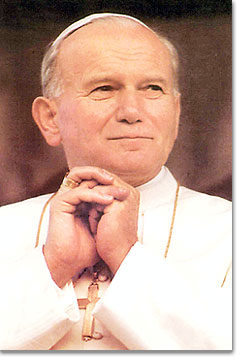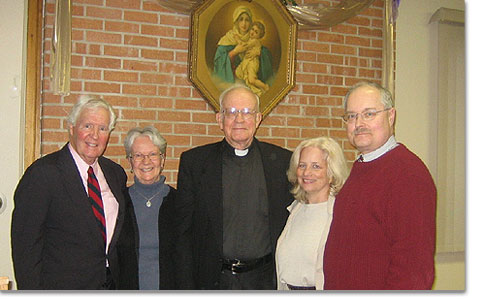 |
 |
Habló sobre Juan Pablo II y su rol en la historia
He spoke about John Paul II and his historic role
Er sprach über Johannes Paul II und seine geschichtliche
Rolle
Foto: Editorial Patris Argentina © 2006
|
|
 |
 |
Durante la conferencia
During the conference
Beim Vortrag
Foto: Jentz © 2006
|
|
| |
|
USA, Christi Jentz. Former United States Ambassador to the Vatican,
Frank Shakespeare, was warmly welcomed by the Schoenstatt Heights community
in Madison, Wisconsin. He was there to present a commemorative speech
dedicated to the memory of John Paul II. "The Blessed Mother wants to
enter in Madison as the great leader, as the great educator for the United
States. She wants to assist us in fulfilling our great mission", explained
Father Kentenich. Is it any wonder that the former Ambassador has been
drawn to the Founder Shrine? "He embodies the best of our nation’s leadership
and our MTA is pleased to greet him when he visits her", thus the conviction
of the Schoenstatt Family.
A highly accomplished broadcast executive in his early career, Shakespeare
served as president of CBS Television and RKO General, Inc. President
Nixon then asked him to join his administration and oversee the United
States Information Agency. Later, Shakespeare chaired the International
Broadcasting Bureau, which included broadcast elements such as the Voice
of America. In the 1980s, he served as chair of The Heritage Foundation,
Washington, D.C.'s premiere conservative think-tank. He also oversaw the
efforts of Radio Free Europe and Radio Liberty, supervising inspirational
transmissions to the freedom-seeking people of the then-Soviet Union and
its Eastern European block. It was in this capacity that Ambassador Shakespeare
served as a front-line warrior in the Cold War and played a part in the
eventual downfall of the Soviet Communist system. In 1985, President Ronald
Reagan called on Mr. Shakespeare to serve as the U.S. Ambassador to Portugal.
Not longer after, he was given the high honor of serving until 1989 as
U.S. Ambassador to the Holy See; only the second American to hold that
post after President Reagan opened official diplomatic relations with
the Holy See.
Not issues, but the essence
The style Ambassador Shakespeare used to deliver his speech was informal.
Never once did he step behind the podium. In fact, he strolled across
the floor in a comfortable manner without using as script. The audience
sat silent as he unfolded the tale of two great men, Pope John Paul II
and President Ronald Reagan.
It was his intention, he explained, to share not issues with the audience
but the essence of the individuals he was remembering. "These were men
that came on the scene at a critical time in history", and that is what
he wanted to present. He suggested we look to historians and scholars
if we want to discuss the issues of that time; his intention was to give
us insights about these men as he was able to witness through his work
as the U.S. Ambassador to the Vatican. In his humble opinion the role
he played in these years was almost like a bystander and the events of
those years left him awestruck. "I am a business person" he stated, "but
by an accident of life it fell that I was able to represent President
Reagan". It turned out to be a pivotal time in history, a time he will
never forget.
Did we realize we were witnesses of a historical landmark?
The Ambassador opened the story with a brief history of the western world
as it had developed in the 20th century. He talked of the escalation of
Soviet power and how it brought death, damage and military horror that
had cursed man well into the last part of the century. "In the world of
1978 there existed a profoundly evil tyranny with a serious intent to
eliminate Western civilization". But this all came to an end in such a
way that no one was predicting in the late 70’s and, in retrospect, it
happened so quickly, he added. "The world changed fundamentally in that
dozen years…it did so because of the efforts of two or three exceptional
human beings".
The election and first years of the pontificate of John Paul II and the
first year of the presidency of Ronald Reagan are noteworthy according
to Shakespeare.
Pope John Paul II
The Italian Popes had reigned for 450 years. After the death of Pope
Paul VI in 1978, it was presumed that the conclave would choose a pope
from a short list of maybe four or five of the most eligible Italian cardinals
and this is exactly what they did. Pope John Paul I was the Cardinal and
Archbishop of Venice. He died after serving only 33 days. This time, when
the cardinals were called back to Rome, it was a very different setting.
"It changed them for the second conclave…they wondered ‘what is God trying
to tell us’. The result was a stunning. Men of tradition broke tradition
and chose a Polish-Slovakian. The world and the Soviet Union were stunned!"
Pope John Paul II knew communism. He knew street communism. His genealogy
was made up of very strong, tough people. Shortly after his election,
the Pope traveled to Poland and "the Poles who had been mistreated for
centuries go crazy. All of Central Europe is in ferment, how do we handle
this?"
President Ronald Reagan
"In 1980", continues Shakespeare, "the greatest spiritual force on earth
has John Paul II and the greatest temporal force elects Reagan. It was
quite extraordinary that we elected a grade B movie actor, however he
was a very unusual person". Early in the Reagan presidency, on March 30th,
1981, Reagan is shot… "He knows if the bullet goes 1/8 inch differently,
he’s a dead man". After that, "There was a profound transformation in
his thoughts." Reagan, who was not a Catholic, wanted to talk with a prelate,
and his aid, Michael Deaver, arranges to fly Cardinal Cook of New York
in to see him on Holy Saturday. During this time period, Deaver heard
Reagan say, "I don’t know what it all means but I know now that whatever
time I have left belongs to him (God)."
What else could happen? On May 13,1981, the Pope is shot. Once again,
"he knows if the bullet goes 1/8 inch differently, he’s a dead man." The
Pope is heard to mumble that the Madonna saved his life. In the hospital
he studies Fatima.
The Pope and Reagan
Shakespeare believes these parallel events are no coincidence. Reagan
goes on to develop a new policy that would put an end the Soviet Union.
He meets with Pope John Paul II - one on one. No one is invited to listen
in on those meetings. At one point, Shakespeare tells the audience, he
is sitting with President Reagan after the President and Nancy Reagan
had finished their visit to the Vatican. While there, Reagan had a private
meeting with the Pope. Nancy was now changing into appropriate attire
for another event, and this gave Shakespeare time to ask the President
if there was anything he should know about the meeting that would help
him serve the country better. The President talked with him for 20 minutes
about his meeting with the Pope. At the end of the conversation, Shakespeare
asks the President if he can make a suggestion, "I don’t want to report
this back", he says to the President, "then you’ll control 100% (of the
information)". The President replied "well that’s fine, let’s do that".
The emphasis here was on how very private things were kept. To this day,
Ambassador Shakespeare will not break the agreement he made with Reagan
and the details of that meeting and any others remain speculative. What
Ambassador Shakespeare will reveal is that "both men knew what the other
was. They were the only two leaders of the world shot…it was almost a
mystical bond." He further elaborated at the end of his speech that he
was convinced that both men were mystics. "They had a profound trust and
confidence in each other".
Lech Walesa and Mikhail Gorbachev were two more players who now entered
into positions that no one would have thought likely only a short time
before. As Shakespeare watched events unfold and studied these four men,
he became "convinced that mankind had nothing to do with those men coming
on the scene."
The result was that in 1991, under the reign of Gorbechev, the end of
the Soviet Union came. But "we should understand that it couldn’t have
happened without the presence of the Pope".
Fatima
Ambassador Shakespeare wanted to end by emphasizing the Pope and Fatima.
The Pope visited Fatima early in his Papacy. He visited again after he
was shot and he left his attacker’s bullet at the foot of a three foot
statue of Mary. That bullet is now embedded in the crown adorning that
statue. On May 13, 2000, he returned again, this time leaving his papal
ring. That ring is now on a golden chain, hanging from the hands of the
same Marian statue that contains the bullet. During that last trip, he
also beatified two of the Fatima children. Shakespeare staunchly believes
that Pope John Paul II was the Pope of Fatima, and he believes the Pope
made that quite clear.
Ambassador Shakespeare was the Ambassador to Portugal just prior to his
appointment as U.S. Ambassador to the Vatican.
What does he see when he looks back on this time period? "Through it
all is the extraordinary weaving of Fatima". What caused the Soviet Union
to fall? "I have to accept that very providential things were occurring".
Sure he saw that certain strategies were effective but that was on the
surface. "There were successful things but all was irrelevant".
After the speech ended there was time for more conversation and refreshments.
A small group gathered around the Ambassador as he told two stories about
Pope John Paul II that revealed something about his playful side. The
Pope had a great sense of humor, he wanted them to know.
|


